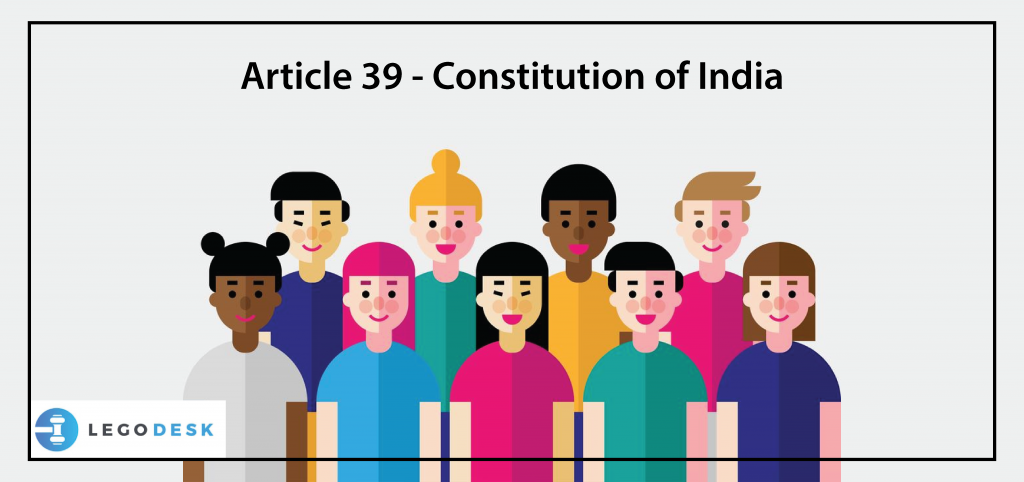Article 39 – Constitution of India

The constituent assembly finally completed the constitution of India after hard work of almost three years in November 1949 and enacted in the year January 1950. The provisions under the Indian constitution is defined in toto 22 parts and 12 schedules. Each part has its significance and explained provision accordingly. In all parts, part 3 and part 4 is considered as one of the very important provisions in Indian Constitution. Part 3 is Fundamental Right while on another hand, part 4 is Directive principle for state policy which borrowed from the constitution of Ireland.
Article 39 is considered as one of the very important provisions of part IVth (i.e., Directive principle of state policy) in the constitution of India whose main objective of the is to provide the direction or guidelines in another word, to the state which has relation in policymaking. It describes the area where the state must have to take into consideration of work to grow as a welfare state where the interest of every person has some important effects or taken into consideration in other words. All the policies which are to be established must be under the preview of this article as this is considered as the pioneer of policy establishment.
Directive Principles
The Directive Principles of State Policy (DPSP) as we discussed above are generally referring to any guidelines or principles (moral principle considered by some renowned legal fraternity) provided to the federal institutes governing the state of India, which to be kept in citation part or the endnote part while framing laws and policies for the Nation. These provisions, provided in Part IV (Article 36–51) of the Indian Constitution, are not justiciable (meaning not enforceable) by any court, but the principles which laid down therein are not considered in the governance of the country, as it is basically the duty of the state to apply these principles in making of laws to establish a better society in the Nation. The very moral principles have been inspired by the Irish constitution which has their relation in context to social justice, the welfare of the economy, or the making of foreign policy and along with these also helps into a matter which related to the legal and administrative issue.
Directive Principles are divided into the categories like economic and socialistic, political and administrative, justice and legal, environmental, protection of monuments, peace, and security is the area where these moral principles are based on.
Article 39 – Constitution of India
Article 39 comes under the ambit of the socialist type of moral principle. Along with Article 39 (certain policies shall be taken into consideration by the state), Article 38 (protection of social order), Article 41(Right to work and education and in public assistance), Article 42 (maternity relief and human condition) Article 43 (participation of workers in industries management) and Article 45 (for childhood care especially, educations for the children below six years of age) are the part of this type of principle.
Article 39 states that the Indian constitution shall be directing this policy for securing citizens following –
(a) The first part gives adequate livelihood to every citizen, including all men and women, and these rights are equal.
(b) Secondly, resource distribution of community (including ownership and control) for the common good as for the welfare of the society.
(c) thirdly, the economic system operation shall not result in the concentration of wealth and means of production to the common detriment in short safety of the person who is citizens of the country,
(d) Every person has equal pay for equal work irrespective of sex.
(e) the fifth point defines that the strength of the men or women or workers who get involve themselves in working is not going to be abused including the tender age of children, and also no citizens including the children were not actually got fore bt any type of economic necessity in involving any avocation which not suits to their ages or strength.
(f)that the last point explains about the children safety that every child are must get an opportunity or facilities to develop themselves in a very healthy manner, and along with with that every children’s reputation or dignity in another word shall be secured against any kind of exploitations or immoral and material abandonment.
(the last provision that is 39(f) was inserted by the 42nd constitutional amendment act 1976 (w.e.f. 3-1-1977))
Try our Debt Resolution solutions today Request a Demo